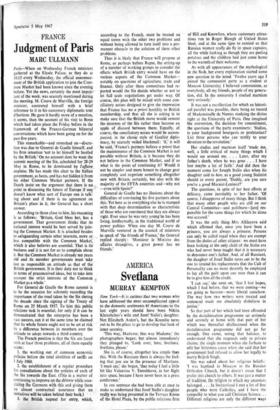Judgment of Paris
FRANCE MARC ULLMANN
Paris—When on Wednesday French ministers gathered at the Elysee Palace, as they do at 10.15 every Wednesday, the official announce- ment of the British application to join the Com- mon Market had been known since the evening before. Yet the news, certainly the most impor- tant of the week, was scarcely mentioned during the meeting. M. Couve de Murville, the foreign minister, contented himself with a brief reference to it in his customary diplomatic tour d'horizon. He gave it hardly more of a mention, it seems, than the account of his visit to Bonn which had taken place the Friday before in the framework of the Franco-German bilateral conversations which have been going on for the past five years.
This remarkable—and remarked on—discre- tion was due to General de Gaulle himself, and his firm intention 'not to let himself be hustled by the British.' On no account does he want the summit meeting of the Six, scheduled for 28-29 May in Rome, to be dominated by raffaire anglaise. He has made this clear to the Italian government, as hosts, and has not hidden it from his other Common Market partners. If the Dutch insist on the argument that there is no point in discussing the future of Europe if one doesn't know what sort of Europe one is talk- ing about and if there is no agreement on Britain's place in it, the General has a short answer.
According to those close to him, his reasoning is as follows: 'Britain, God bless her, has a government. That government thinks that its national interest would be best served by join- ing the Common Market. It is attached besides to safeguarding certain other interests, more or less compatible with the Common Market, which it also believes are essential. That is its business and it is not for us to complain about it. But the Ccmunon Market is already ten years old and its member governments must take just as responsible an attitude as that of the British government. It is their duty not to think in terms of preconceived ideas, but to take into account the strict interests of the Common 4. Market as a whole.'
For General .de Gaulle the Rome summit is to be the occasion for solemnly recording the importance of the road taken by the Six during the decade since the signing of the Treaty of Rome on 25 March 1957. To him this public relations task is essential, for only if it can be demonstrated that the enterprise has been a vast success, can it at the same time be claimed that its whole future ought not to be set at risk by a difference between its members over the attitude to adopt towards a third country.
The French position is that the Six are faced with at least three problems, all of them equally acute:
1. the working out of common economic policies before the total abolition of tariffs on 1 July 1968.
for consultations about the policies of each of
2. the establishment of a regular procedure
the Six towards the East. (This is a matter of continuing to improve on the détente while asso- ciating the Germans with this and giving them an almost contractual assurance that no initiatives will be taken behind their back.)
3. the British request for entry, which, according to the French, must be treated on equal terms with the other two problems and without being allowed to turn itself into a per- manent obstacle to the solution of these other problems.
Thus it is likely that France will propose at Rome, or perhaps before Rope, the setting-up of a number of working groups to consider the effects which British entry would have on the various aspects of the Common Market— notably on questions of agriculture, trade and finance. Only after these committees had re- ported would the Six decide whether or not to let full scale negotiations get under way. Of course, this plan will be mixed with some con- ciliatory noises designed to give the impression that France has no a priori hostility to British membership, and that all she is asking is to make sure that the 'British move would cement the -interests of the Six rather than become an apple of discord between them. 'Equally, of course, the conciliatory noises would be accom- panied, in the classic -style of Gaullist diplo- macy, by scarcely 'veiled blackmail : 'if,' it will be said, 'France's partners believe a priori that the maintenance of the Common Market is not possible without Britain, is it because they do not believe in the Common Market, and if so what is the point of continuing it? Would it not be simpler and more honest to change gear completely and negotiate something altogether new with Britain, certainly, but also with the majority of the EFTA countries and—why not —even with Spain?'
General de Gaulle has no illusions about the difficulties of convincing his five partners about this. Yet here as in everything else he is stamped with that deep -determination so characteristic of those who are convinced that they are always right. Ever since he was very young he has been living, intellectually, in the traditional world of power politics When one day M. Couve de Murville ventured in the council of ministers to speak of 'the friends of France,' the General replied sharply : 'Monsieur le Ministre des affaires dtrangeres, a great power has no friends.'


































 Previous page
Previous page